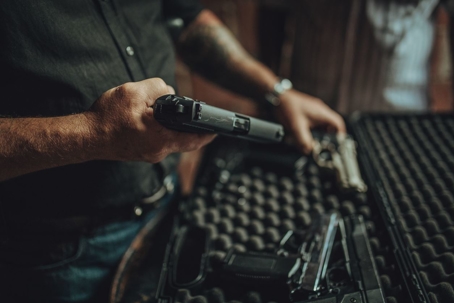One of the things that we have noticed lately is an increase in persons being charged for possessing a firearm after they have recently been charged with a felony. You may have scratched your head when you read that sentence, but the thought occurred to me that this may be a topic worth writing about that may also help clear up many misinterpretations of the laws regarding this matter.
Mississippi law is very clear that if you have been arrested, charged, or even indicted, you have a right to keep a firearm unless a court makes the possession of a firearm a condition of your pretrial release. Just like every general rule, though, there are exceptions. A person who is already a convicted felon is absolutely prohibited from possessing a weapon unless a court has restored that person’s gun rights. Another common exception is that a court may order, as a condition of pretrial release, that a person not possess a firearm. Additionally, if a person is participating in a deferred sentencing program like drug court, pretrial diversion, or non-adjudication, a condition of the person’s participation may also be that they cannot possess a firearm. Even assuming an exception applies, and a person is indeed not supposed to possess a firearm, this does not mean that they should receive a charge for felon in possession of a firearm should they be caught with one. Rather, the person should typically be charged with contempt of court (violating a court order). Why? Because the person has not yet been convicted.
But there’s another level to this that is often overlooked. Even though Mississippi law says that only a convicted felon cannot possess a firearm, federal law is much harsher. Under federal law, not only can convicted felons not possess a firearm, neither can anyone who has been indicted for a felony.
Here’s an example. Let’s say that Danny is not a convicted felon, but he was recently indicted for grand larceny, which is a felony. The day after he is indicted, he is pulled over by the Humphreys County Sheriff’s Department, searched, and the deputy finds a gun in Danny’s truck. The deputy then charges Danny with possessing a firearm, alleging that Danny should not have it since he has been indicted. That same day, the deputy contacts a federal agent, and the federal agent files a separate charge against Danny, saying that he unlawfully possessed a firearm. Which charge will stick? The answer: the federal charge. Since Mississippi allows Danny to have a firearm, even though he’s been indicted, the Mississippi charge will likely be dismissed. On the other hand, the federal charges will likely move forward since it is against federal law to have a firearm if a person has been indicted for a felony.
The thing to remember is that if a person has been charged with any crime, especially a felony, the best thing to do is make sure that the person does not possess any weapons (or go around any weapons) until the criminal matter is resolved. This is especially true if the person has already been indicted, since they may run the risk of violating federal law even though Mississippi law would be accepting of them possessing a weapon. Considering that federal law is generally much harsher than Mississippi law, especially when it comes to penalties, it is always best to play it safe, and just wait until everything is resolved before possessing or being near a weapon.

